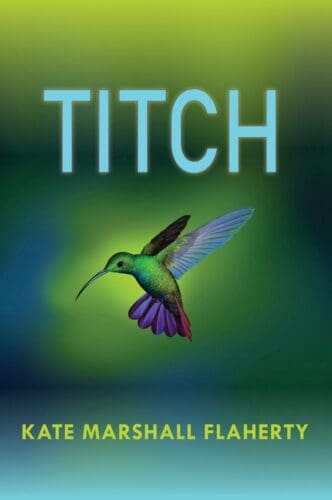Review: Titch by Kate Marshall Flaherty
Reviewed by Elana Wolff

Titch
by Kate Marshall Flaherty
Piquant Press, 2023
144 pages, $20.00
ISBN: 9781927396285
The poems in Kate Marshall Flaherty’s sixth collection, Titch, abide between sacred light and enduring beauty—scarred, whole and restored. These are poems that face the world—its natural wonders and human challenges, with strength and reverence; that openly welcome a reader in, and never forget to breathe. The title of the collection, an informal British word meaning ‘small’—and printed in large uppercase letters on the cover—captures the wide wrap of Flaherty’s poetic embrace. Fifty-nine conscientiously composed poems, including links to seven video versions. Six of these are beautifully produced in collaboration with her son Gabriel and composer/filmmaker Mark Korven; the seventh is a glorious evocation, by filmmaker Lori H. Ersolmaz, of the ethereal piece “Practicing Like Water” whose lines shimmer with beatific élan: “Have we been floating with angels? / Practicing for death, / in sleep? / Are we slipping into a pool / where dreamer and dream are one? / Are we each a cup of water / poured into the sea?”
The collection is arranged in seven sections—the title of each drawn from a piece that highlights a key thematic concern. “gills wide for breath”—the title of the first section—is drawn from the poem “salmon,” in which Flaherty writes herself into the river-skin of the fish and announces her inborn determination to prevail in the difficult upstream swim of life; “i can do this,” she announces—kin to the fish. The title of section two, “the spin came to a stop,” is drawn from the poem “Being Unmade,” which tells of a time Flaherty’s “dad rented Paddle to the Sea / on an old metal projector wheel for [her] basement birthday for the whole class.” It was when her father “played the film backwards, / in a strange slow language, / like marbles in the mouth … that the clapping was real / and the final celluloid strip circle- / snapped.” The poems in this section address the end of things, “impermanence,” “the salt content of tears,” and “suffering”— in Flaherty’s characteristic mode of wistful, plainspoken steadfastness. Section three, “habitat” contains sixteen pieces that center lovingly on family: brother, daughter Annie, mother, sons Gabriel and Locky. Here the voice is urgent, immediate, protective, always loving: “… stand up for yourself … Show some backbone”; “there is a place of safety”; “I know healing can come after trauma.” The fourth section, “conquering softened,” looks to the “boneyard” and the resilience of the body and says, “I see the axe in acceptance … Resentment is like drinking hemlock … I can be flexible … Let’s remember the oak and cypress. / Standing side by side … they both make equal shade.” Section five, “something lighter about to lift off,” comprises ten poems that speak to things that are “hovering,” “thin[ning],” “letting go,” “readying for liftoff.” Like the “Cowbird,” clouds, “Dad’s baseball cap,” “a great blue heron,” music, “The Dead.” Section six, “mountain’s slow reflection,” speaks “of love / that never dies / just changes form,” of mountains—their call “in my every move,” of Falls, back-woods and campfires: wild places where there is no path, and Flaherty leaves her singular trail. And section seven, “a titchy little titch,” features her most powerful, plaintive and personal piece, “To the Radium Girls”—women “called the living dead” who worked “never-ending factory hours,” “painting clocks’ faces” and were poisoned by the “moonlit paint”—marketed under the brand name Undark. They never lived to see the “bright outcomes” of their “first class action suit,” but their “short lives stopped the clock for a moment / on lies dressed for profit.” Flaherty “lights a candle” for the glowing “radium ladies” as she ponders her own radiation treatment—“burns erupting,” “red flesh tattoos”: “They say your graves set off a thousand / Geiger counters, even today. / What will they say in twenty years / about my own molten plastic breast?”
Kate Marshall Flaherty acknowledges the inspiration and creative support of a host of local friends and fellow creators. She also names Rumi and a number of American poets in her poems: Mary Oliver (implicitly), Naomi Shihab Nye, Ellen Bass, Jericho Brown, Marie Howe, Ralph Waldo Emerson, and John Brehm. Her sympathies are with naturalism, practical spirituality, personal faith, and inclusiveness. In Titch, she brings fresh gusto and dexterity to her longstanding poetic concerns for family, friends, community, nature, and the metaphysical dimensions of daily life. The reader will rejoice in her abundance.

Kate Marshall Flaherty has six books of poetry and has been published in numerous Canadian and international journals. She writes “Poems of the Extraordinary Moment” for charities and guides Stillpoint Writing and Editing circles in person and online.

Elana Wolff lives and works in Thornhill, Ontario—the ancestral lands of the Haudenosaunee and Huron-Wendat First Nations. Her cross-genre Kafka-quest work, Faithfully Seeking Franz (Guernica Editions, 2023), is now available for preorder.
